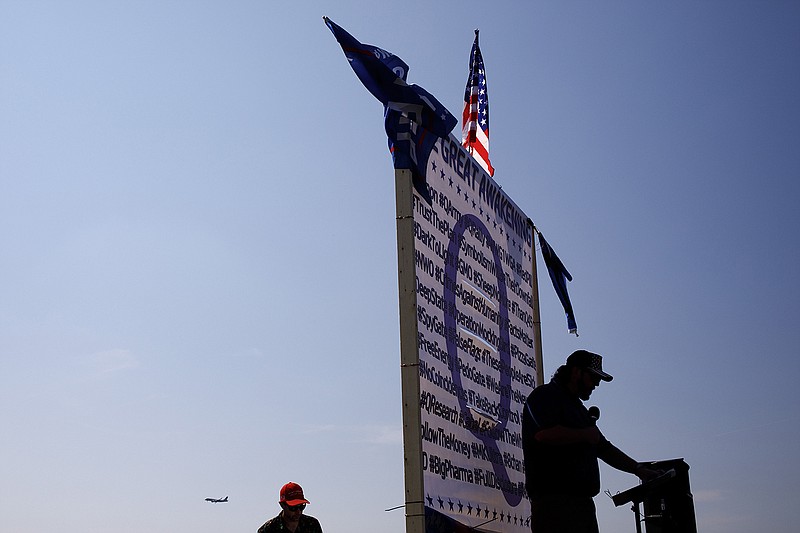The results of last week's midterm elections were remarkable for two reasons. Democrats retained control of the Senate, and while Republicans may take over the House, their majority will be significantly small. But the election also reinforced the truism that political moderates, not the far left or far right factions, traditionally determine which party prevails.
The more important takeaway is that the Jan. 6 insurrection at the nation's Capitol stunned more Americans than had been assumed. They apparently decided months ago to make their displeasure plain by using the only weapon they have: their vote, a political two-by-four meant to ensure the GOP got their message.
Having ingested four years of Donald Trump's lies about "rigged" elections and voter fraud, many of the arrested rioters claimed they believed he had encouraged them to protest his defeat. And for nearly 22 months, moderate voters were watching as many party members, ever fearful of Donald Trump's wrath, brazenly refused to contradict his claim that "they" had stolen the election from him.
It's still unclear whether the political nihilists will renounce their subservience to Trump, whose six years of lies led to the GOP's current dilemma. But it is telling that as The Washington Post reported, voters in six major battleground states rejected efforts by election deniers who had promised drastic changes for the states' election systems. It quoted Georgia Secretary of State Brad Raffensperger, a Republican, who called the midterm results "a vote for normalcy."
Party leaders found some solace in the news that some 170 election-denying Republicans who voted against the routine Electoral College count by Congress won their House races. (Among them: the seven GOP incumbents in Tennessee's congressional delegation.)
It's worth noting, however, that most candidates who lost decided against claiming they were voter fraud victims. If that means future office seekers will refuse to attack the integrity of elections should they lose, that could strengthen the bedrock of American democracy.
But that's not enough. State legislators nationwide ensure that voters are not pawns in the political back-and-forth that often complicates the electoral process. It is encouraging that reports from the states suggested their elections went smoothly despite increases in the number of voters who showed up.
Legislators have time enough before 2024 to come up with ways to improve how their elections are conducted without undermining the integrity of the process. Taking steps to make it easier for citizens to vote while protecting the integrity of the process are not mutually exclusive.
Jennifer Rubin, a columnist for The Washington Post, wrote recently that "the midterm elections could have gone badly [amid] concerns that right-wing groups would resort to voter intimidation." But that didn't happen. "In fact, while threats to democracy remain, 2022 might be seen as the point at which the erosion of democratic values and critical institutions were halted."
While some assume the 2022 midterm results will prevail two years hence, it's difficult to predict the tactics right-wing groups are planning for the 2024 election when the political stakes will be much higher.
Republicans who want to rescue the GOP from extremists should consider the John Birch Society, arguably a predecessor of Trumpism. It trafficked in conspiracies that resonated with his followers -- including founder Robert Welch's infamous description of former President Dwight Eisenhower as "a dedicated, conscious agent of the Communist conspiracy."
William F. Buckley Jr., founder of the conservative magazine National Review, "was beginning to worry that with the [JBS] growing so rapidly, the right-wing upsurge ... would take an ugly, even Fascist turn," John Judis wrote in his biography of Buckley.
Erick Trickey wrote in The Washington Post in 2021 that before the 1964 election, Buckley told Barry Goldwater that the organization was a "menace" to the conservative movement. Goldwater "wanted to distance himself from the conspiracy theories but feared alienating his base." (Sound familiar?)
A year after Goldwater's landslide loss to President Lyndon Johnson, Ronald Reagan responded to critics linking him to the JBS by firmly distancing himself from the organization, clearing the way for his election as California's governor.
A 1960s-era folk group, The Chad Mitchell Trio, famously satirized the John Birch Society with a tag line asserting the group was "fighting for the right to fight the right fight for the right." Maybe someone can do the same for QAnon and the Proud Boys.
Michael Loftin is a former editorial page editor for The Chattanooga Times.
